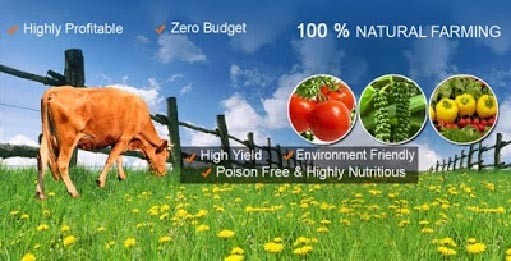
Dr Hannah Krujia
ACTO Agronomy, KVK Phek
Zero-Budget Natural Farming (ZBNF) is a holistic alternative to the present paradigm of high-cost chemical inputs-based agriculture. It is very effective in addressing the uncertainties of climate change. ZBNF uniqueness is based on the latest scientific discoveries in Agriculture, and at the same time it is rooted in Indian tradition. UN-FAO in April 2018 urged all countries to move towards the adoption of Agroecology to meet the twin goals of global food security and conservation of the environment. Zero Budget Natural Farming (ZBNF) is a farming practice of natural growth of crops without adding any fertilizers and pesticides or any other foreign elements. The word Zero Budget refers to the zero net cost of production of all crops (inter crops, border crops, multi crops). The inputs used for seed treatments and other inoculations are locally available in the form of cowdung and cow urine. ZBNF crops helps in retaining soil fertility and is climate change resilient.
Benefits of Zero Budget Natural Farming (ZBNF)
1. ZBNF aims to ensure that farming, particularly smallholder farming is economically viable by enhancing farm biodiversity and ecosystem services.
2. It reduces farmers costs through eliminating external inputs and using in-situ resources to rejuvenate soils, while simultaneously increases income, and restore the ecosystem health through diverse, multi-layered cropping systems.
3. Cow dung from local cows has proven to be a miraculous cure to revive the fertility and nutrient value of soil. One gram of cow dung is believed to have 300 to 500 crore beneficial micro-organisms. These micro-organisms decompose the dried biomass on the soil and convert it into ready-to-use nutrients for plants.
4. Resilient food systems are the need of the day given the variability of the monsoons due to global warming and declining groundwater in large parts of India. The drought-prone regions in India are reportedly considering promising changes already in farms with the ZBNF.
5. Zero budget natural farming requires only 10% water and 10% electricity than what is required under chemical and organic farming. ZBNF may improve the potential of crops to adapt to and be produced for evolving climatic conditions.
The four-wheels of zero budget natural farming require locally available materials:
1. Water vapour condensation for better soil moisture.
2. Seed treatment with cow dung and urine-based formulations.
3. Mulching and soil aeration for favourable soil conditions.
4. Ensure soil fertility through cow dung and cow urine-based concoctions
Government initiatives to support ZBNF:
1. Government of India has been promoting organic farming in the country through the dedicated schemes of Paramparagat Krishi Vikas Yojana (PKVY) since 2015-16 and also through Rashtriya Krishi Vikas Yojana (RKVY).
2. In the revised guidelines of PKVY scheme during the year 2018, various organic farming models like Natural Farming, Rishi Farming, Vedic Farming, Cow Farming, Homa Farming, Zero Budget Natural Farming (ZBNF) etc. have been included wherein flexibility is given to states to adopt any model of Organic Farming including ZBNF depending on farmer’s choice.
3. Under the RKVY scheme, organic farming/ natural farming project components are considered by the respective State Level Sanctioning Committee (SLSC) according to their priority/choice.
Sources:
1. Case study provided by La Via Campesina, FAO 2016
2. The Hindu, 8th July 2019





